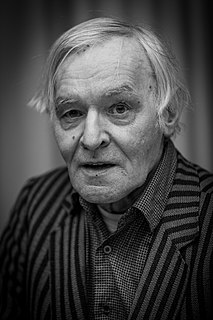A Quote by Timothy Noah
Deciding which ideas to save and which ideas to discard is one of society's most important tasks.
Related Quotes
To criticize a person for their race is manifestly irrational and ridiculous, but to criticize their religion, that is a right. That is a freedom. The freedom to criticize ideas, any ideas - even if they are sincerely held beliefs - is one of the fundamental freedoms of society. A law which attempts to say you can criticize? and ridicule ideas as long as they are not religious ideas is a very peculiar law indeed.
In a society that considers all genuine ideas subversive, which seeks to discourage ideological imagination, and which aims to abolish thought in favour of spectacle, the main goal must be to awaken people’s consciences, raising traumatising problems and sending ideological electroshocks: shocking ideas.
There is only one Art, whose sole criterion is the power, the authenticity, the revelatory insight, the courage and suggestiveness with which it seeks its truth. ... Thus, from the standpoint of the work and its worth it is irrelevant to which political ideas the artist as a citizen claims allegiance, which ideas he would like to serve with his work or whether he holds any such ideas at all.
You have to have a lot of ideas. First, if you want to make discoveries, it's a good thing to have good ideas. And second, you have to have a sort of sixth sense-the result of judgment and experience-which ideas are worth following up. I seem to have the first thing, a lot of ideas, and I also seem to have good judgment as to which are the bad ideas that I should just ignore, and the good ones, that I'd better follow up.
The ideas of the ruling class are in every epoch the ruling ideas, i.e. the class which is the ruling material force of society, is at the same time its ruling intellectual force. The class which has the means of material production at its disposal, has control at the same time over the means of mental production, so that thereby, generally speaking, the ideas of those who lack the means of mental production are subject to it. The ruling ideas are nothing more than the ideal expression of the dominant material relationships, the dominant material relationships grasped as ideas.
Many of the products which create a modern standard of living are only the physical incorporations of ideas- not only the ideas of an Edison or a Ford but the ideas of innumerable anonymous people who figure out the design of supermarkets, the location of gasoline stations, and the million mundane things on which our material well-being depends. Societies which have more people carrying out physical acts and fewer people supplying ideas do not have higher standards of living. Quite the contrary.
What I call middle-class society is any society that becomes rigidified in predetermined forms, forbidding all evolution, all gains, all progress, all discovery. I call middle-class a closed society in which life has no taste, in which the air is tainted, in which ideas and men are corrupt. And I think that a man who takes a stand against this death is in a sense a revolutionary.
































